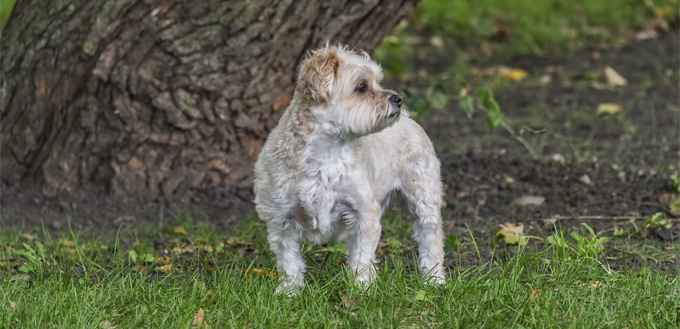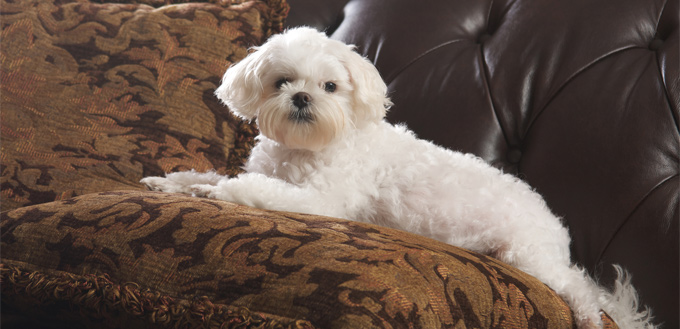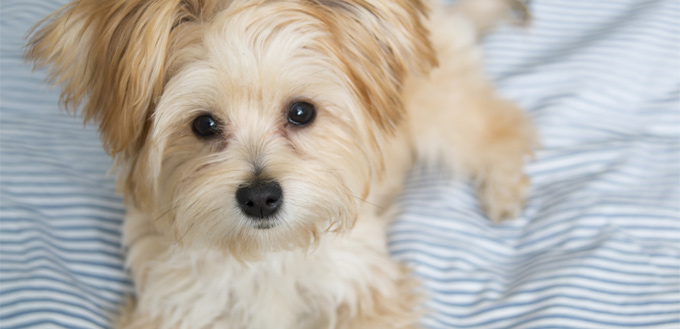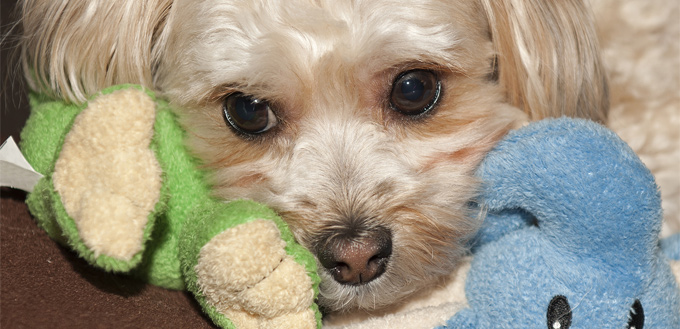Combining the elegant good looks and charm of a Maltese with the tear away personality and cheekiness of a Yorkshire Terrier is going to result in an irresistible pup. That is what you get with a Morkie. They are one of the super cute breeds of hybrid pups who make great companion dogs and a loyal friend. Here’s what you need to know about the very popular breed before you rush out and get one yourself.

History of the Morkie
No one is completely certain when and where the Morkie originated but it is thought to be in the USA or Canada sometime in the 1990s. They are one of the new hybrid dogs that were bred to satisfy the market for cute, designer dogs similar to those owned by celebrities. In the past decade, they have become more popular in the UK also. Some people prefer to call them ‘Morkshire Terriers’.
The Maltese is an ancient breed and, as their name suggests, they have a strong association with the island of Malta. They are sometimes called the “ancient dog of Malta”. There are pictures of Maltese dogs on Greek water vessels dating back as far as 500 BC. Some experts believe that the breed originated in Asia which is supported by the fact that it is related to the Tibetan Terrier. They were probably originally bred to control rodents but later became a comforter and companion dog.
The history of the Yorkshire Terrier is very different. The breed first emerged in the mid-1800s. They are named after the area where they originated in the north of England. Yorkshire was a hotbed of dog cross-breeding at this time as people arrived to work in factories and mines during the Industrial Revolution. The newly built factories soon developed a rat problem and terriers were the perfect solution. The Yorkshire Terrier was so compact that they could literally be carried in the pockets of factory and mine workers and released to catch rodents in confined spaces. From these unglamorous beginnings, the breed rose to become a favourite lap dog of the English aristocracy and royalty. Today, it is one of the most popular small breeds in the U.S. and the U.K.
Who are the Parents?
Will your pup inherit Mom or Dad’s characteristics? Hybrid breeds can inherit traits from either parent so it is a good idea to know what you are in for! Here’s what you need to know about the Maltese and Yorkshire Terrier breeds.
Maltese
Maltese are super cute companion dogs with a glamorous long coat and dark eyes. They are sweet natured and intelligent and will be entirely devoted to their humans. They don’t need a great deal of exercise and are very happy staying at home with you where they may a good watchdog. They have been companion dogs for thousands of years and now have it down to a fine art which has advantages and disadvantages. On the plus side, they will be your loyal companion and thrive on attention and affection. On the downside, they will not like to be separated from you and will suffer from separation anxiety if you are gone for long periods. They can also get snappy with other dogs and even with children. You will need to work hard on their socialisation to overcome these traits.

Yorkshire Terrier
The Yorkshire Terrier is affectionately known as the Yorkie and has a long, silky coat that sheds very little. Pups are black but a blue and tan coat develops after a year and eventually becomes the characteristic grey/brown and tan. In terms of personality, they are very confident little dogs. Most of them seem to be completely oblivious to the fact that they are small in stature and are always on the lookout for trouble. Although they are good companion dogs, they can be suspicious of strangers which can lead to a lot of barking when you get visitors and they have been known to be aggressive towards other dogs. They don’t like to be left alone and can be snappy if teased by children.
You May Also Like: Dog Foods To Feed Your Yorkie

Quick Facts
Let’s get you up to speed with some quick facts about the little Morkie that you probably didn’t know:
- They live for around 13 to 15 years and most Morkies enjoy good health.
- They are small dogs. The average adult is about six to ten inches high and weighs between four and 12 pounds. Obesity can be a problem so it is important to maintain a healthy diet.
- The ‘cute’ factor comes from their short snouts, fluffy ears, and big eyes. The ears can be pointy or floppy. Their tail is short and curls upwards.
- They have a fine, long and silky coat which is straight or wavy. There is a great variety in the possible colour patterns but they are generally similar to the Yorkshire Terrier. The topside is usually dark black or brown and the underside is usually light brown but can be white. Some pooches are spotted but others are solid white, black or brown.
- A Morkie’s jaw and muzzle are quite fine which makes them prone to dental disease. They have a lean and sinewy neck. In the absence of joint problems, the legs are straight.
Things You Should Know
The lovely little Morkie is a great candidate as a loyal lap dog and is becoming very popular with style-conscious dog owners. However, before you welcome one into your home, here are a few things that you should bear in mind.
- Training
Training a Morkie is not hard because they will be eager to please you but it will take perseverance and patience. They are clever but they can also be stubborn and may not bend easily to your will.
Always be positive about training and reward good behaviour rather than punishing bad behaviour. They can become uncooperative and sullen if they are treated harshly. Dog clicker training works very well with Yorkies. You can use a special pet clicker to make a sound as soon as your Morkie has done something that deserves praise. They will soon learn that a ‘click’ means that a food treat is coming! It’s more useful than your voice because it is consistent (your tone of voice is influenced by your mood) and it is very quick. The timing of a reward is very important to Morkies and a quick reward establishes trust.
Morkies love to play games with you and will relish a training session. They actually need a lot of mental stimulation to stay happy and all that one-on-one attention will maintain good behaviour. It won’t take them long to pick up tricks.
Separation anxiety is an issue that you will have to work on the right from the start. You can begin with short periods of separation and build it up. However, it is important to realise that a Morkie is never going to be a big fan of being left alone for long periods.
Overall, the best advice for training your Morkie pup is to start early and set out some clear objectives. In the early days, you should be focussing on:
- Toilet training to eliminate ‘accidents’ in the house
- Socialisation with other dogs and humans
- Nipping bad habits, such as destroying furniture, in the bud
- Stopping excessive barking
- Following basic commands such as ‘sit’
Then you can move on to more complicated tricks and tasks such as giving a paw and rolling over.
You May Also Like: Dog Training Clickers
- Feeding
For such a small dog, the Morkie has a big appetite! This is something you will have to keep an eye on because left unchecked they can become obese. Morkies that are overweight are very likely to have heart problems and issues with their joints. Be strict about feeding unhealthy snacks and keep to structured meals. Treats should only be given when training your pup.
You May Also Like: Dog Treats
Kibbles are a good choice for Morkies because they promote dental health. The firm texture gives the mouth plenty of exercise and scrapes plaque off the dental surface. It also helps to reduce the incidence of gum infections and tooth loss and you’ll notice that their breath is a lot fresher too!
Related Post: Best Dog Food for Maltese
It is best to find a brand that suits your pup and your budget and then stick to it because Morkies do not tolerate a change of diet well. They are known for having sensitive stomachs and a sudden change of diet can trigger a nasty bout of diarrhoea and vomiting.
Of course, you have the option of making your own food for your pooch and many Morkie owners enjoy doing this. It is a sure way of avoiding all artificial additives and keeping an eye on exactly what they are eating. They need a diet based on lean cooked meats supplemented with vegetables (sweet potatoes, pumpkins, and carrots), fruit (bananas, apples and blueberries) and even peanut butter and eggs which are great sources of protein. Their meals must be balanced and you must avoid too much of any one food at a time.
It may be fun to treat your Morkie like your child but when it comes to their diet you must remember that they are a dog. At no time should you give them chocolate, candy, coffee or grapes.
- Exercise
Morkies are energetic little dogs and need two walks a day to keep them satisfied. When they don’t get enough exercise, they get bored and this leads to destructive behaviour. If you don’t want your soft furnishings ripped apart or your neighbours driven mad by incessant barking, you need to provide sufficient exercise.

A nice walk first thing in the morning and a longer one in the evening is perfect. Don’t overdo it though because they only have little legs and get tired quickly. On top of this, some running around after a ball in your home or garden (if you have one) will do the trick.
They are very small dogs and therefore vulnerable to attack by larger dogs or even birds of prey. Therefore, keep them on a leash in public areas and keep a close eye on them if they are playing in your garden.
You May Also Like: Dog Leashes
- Socialisation
The most important aspect of a Morkie’s training is socialisation and it is essential that you get that right. Ideally, you will attend puppy training classes so that they can get used to receiving attention from other dogs and humans. You can start this as soon as they have completed their primary vaccinations and your vet has told you that they can mix with other dogs. Meeting up with friends who have dogs is another good idea.
- Grooming
The Morkie coat does not shed a great deal but it is fine and very soft and develops knots easily if it is not regularly groomed. They are also very short little dogs! This means that their lovely coat drags on or near the ground where it can pick up all sorts of twigs and debris. Unfortunately, they are also susceptible to picking up flea infestations so this is something that you will need to keep a lookout for.
As the owner, you will need to brush their coat with a soft brush at least every other day. They will need a session at professional groomers every few months for a good shave or trim. They will probably love this because Morkies adore being pampered. Pay particular attention to the areas around the feet, the legs, and the tail, because this is where tangles are common. They may need a good wipe down when they come in after every walk or after playing in the garden. It is also important to keep their eyes clean and to remove tear stains with a soft damp cloth. You can also buy specially formulated tear stain remover for dogs. Check over their ears and clean them with a soft cloth regularly.
A monthly bath in a special, good-quality dog shampoo and conditioner will keep their coat healthy and looking at its best but make sure that you rinse all the product off thoroughly.
Their nails will also need some attention because when they get too long they are uncomfortable. If you do not like the thought of doing it yourself, ask your groomer to do it.
Dental care is very important for Morkies because they are prone to issues with their teeth. Brush their teeth about twice a week and report any issues to your vet straight away.
- Health
Hybrid breeds, like the Morkie, can inherit health issues from either of their parents. In the case of Morkies, it is wise to avoid the very small (teacup) varieties as they have often been produced by unethical breeding practices and suffer the worst health. Having said that, most Morkies are very healthy little dogs who can expect to live around 15 years of healthy and happy life.
You can avoid many of the common Morkie health problems by asking to see health certificates for the parents. A reputable dog breeder will have no problem with you asking for this.
Here are some of the more common health problems associated with Morkies.
- Cryptorchidism – This is when one of the (or both) testicles do not descend into the scrotum in a young male dog. Surgery may be required in some cases.
- Dental problems – The delicate and narrow Morkie jaws do not stand up well to a lot of chewing. There can be a build-up of plaque and resulting tooth and gum problems. A good diet, frequent brushing and regular dental check-ups are needed.
- Tracheal (airway) collapse – This is a common health issue in Yorkshire Terriers and therefore Morkies. It causes a malformation of the airway which produces a nasty, harsh cough which gets worse when the dog is running around. If your dog is overweight, it makes the condition worse.
- Glaucoma – The Maltese breed can suffer from a condition called goniodysgenesis. It is caused by poor drainage from the eyes which leads to a build-up of fluid and so the pressure rises. It is uncomfortable and can eventually lead to a loss of sight.
- Hernias – This is a lump or bulge in the abdomen. It happens when the muscles have not fully developed and structures from inside the abdominal cavity poke through. They occur most often around the umbilical area or around the inguinal canal. The groin can also be affected. They can be detected in young puppies.
- Portosystemic shunt – This is a condition that occurs from birth. It is a genetic malformation of the blood vessels. The pups are born with an extra blood vessel bypassing the liver – the organ that would normally remove toxins from the blood. The result is that blood containing toxic material is pumped around the body and impairs normal function. The pups seem to be sluggish and are often smaller than the rest of the litter.
- Hypoglycemia – this is a health problem that occurs in many toy breeds and it is down to a lack of sufficient body sugar reserves. Morkie pups are extremely small and have a very high metabolic rate. It is hard for them to eat enough carbohydrates to keep up with their body’s demands for glucose (simple sugars). It is a real problem just after weaning and makes the pup feel very weak. This makes them even less likely to feed and it becomes a vicious cycle. A pup with hypoglycaemia needs to be force-fed small meals frequently and will need oral administration of glucose for several weeks. Most pups eventually grow out of the condition.
- Patellar luxation – this is the single most common knee joint abnormality in dogs and is very common in Yorkshire Terriers. It occurs when the dog’s patella (knee cap) moves out of its normal position. Once the muscles in the hind leg relax, it returns to its normal position. It is common to see a dog with patellar luxation hold up their hind leg to allow the patella to slot back into place. In some cases, surgery can help.

Temperament
The main message here is: don’t be fooled by a Morkie’s size. There is a lot of personality in that little body. First and foremost, they are true lap dogs. This means that they are perfectly happy to curl up on a chair with you and they form very strong bonds with their owners. They take great delight in playing ball games. Their loyalty is absolute and they will love you forever.
The drawback is that this can evolve into overly dependent behaviour and a condition called separation anxiety. Your Morkie may get very distressed when you leave them alone for several hours and this can turn into continuous barking and destructive behaviour. It is your job to make sure that you teach them how to cope when you are not there. If you work out of the house all day and are out a lot in the evenings, a Morkie may not be the best breed for you because they are happiest when in the constant human company.
Morkies have another side to them. They are completely fearless when they feel they need to protect their humans or their home. They forget how small they are and stand their ground against larger dogs and human visitors!
They will happily live in an apartment in the middle of a city and are generally sociable with other dogs or with children. However, they can be snappy and get injured easily during rough games so if you have very young children they may not be the best breed for you.
They are bursting with energy and excitement and if this is what you are looking for in a companion dog then the Morkie will be your devoted, and very cute, friend!
Related Post: Dog Balls







